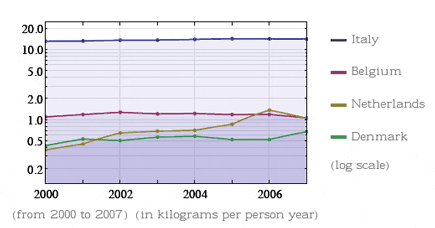Olive oil promotional campaigns are everywhere. Last week Saverio Romano, the Italian Minister of Agriculture, announced a three-year, €5 million campaign targeting the butter-rich countries of Belgium, the Netherlands, and Denmark. Some money will also be earmarked for educating Italian consumers. The campaign is being directed by UNAPROL, the consortium of 550,000 olive growers and 71 regional offices throughout Italy.
Funding the €5,188,922 campaign are the European Union (50 percent), UNAPROL (30 percent), and the Italian government (20 percent). Mr. Romano at the July 6 launch of the campaign said, “We have to improve our communications regarding olive oil by explaining that the Italian quality assurance system, certifications, and inspections are cutting edge. By means of projects such as this we must strengthen international consumption by encouraging the introduction of oil into the diets of other countries, and then communicate the great value added by Made in Italy.”

Per capita consumption of olive oil in Belgium and the Netherlands hovers at about 1 kilo per year, and in Denmark it’s about two-thirds of a kilo. This graph shows the dramatic chasm between consumption in Italy and the new consumer countries targeted by the campaign.
To increase consumption in the focus countries, the campaign will make use of print, in-store promotions, cooking classes, and guided visits for commercial olive oil buyers. The program will be directed at people younger than 50 years old because they are seen as having more disposable income. The promotion focuses on supporting smaller producers, not mass-market brands.
In 2009 Spain also inaugurated its own three-year promotional campaign with Belgium and the Netherlands among the target countries. Their campaign budget is €16.5 million and also focuses on the UK, France, and internal Spanish consumers. Readers of Olive Oil Times will be familiar with the International Olive Council’s recently inaugurated campaign focusing on the United States.
Gargano in a press release said, “Italy is a healthy influence on Europe because it improves the diet of consumers and it helps them make educated choices in their acquisition of extra virgin olive oils.”
It seems that people from the Mediterranean olive producing countries have always been surprised by the diet in transalpine countries. Fernand Braudel in his book on the Mediterranean in the 16th century, introduced two entertaining quotes about the northern diet from the point of view of Antonio Vázquez, a Spanish soldier who chronicled his long stay in Flanders, and by the Bishop of Aragon who went to live in the Netherlands. The following is from Braudel’s book:
“For Alonso Vázquez and the Spaniards of his time (and probably of all time) Flanders was ‘the land where there grows neither thyme, nor lavender, figs, olives, melons, or almonds; where parsley, onions, and lettuces have neither juice nor taste; where dishes are prepared, strange to relate, with butter from cows instead of oil.…
‘The Cardinal of Aragon, who reached the Netherlands in 1517 with his own cook and his own supplies, shared this opinion. ‘Because of the butter and dairy produce which is so widely used in Flanders and Germany’, he concluded, ‘these countries are overrun with lepers.”
The clergyman was of course very wrong (leprosy, now known as Hansen’s Disease, is caused by bacteria). Nonetheless, the health benefits of olive oil are a large driver in boosting consumption and will surely be used in the various campaigns.
Fernand Braudel, The Mediterranean and The Mediterranean World in the Age of Philip II, trans. from the French by Siân Reynolds, vol. I, p. 237, New York: Harper & Row, 1972, vol. I, p. 237.








